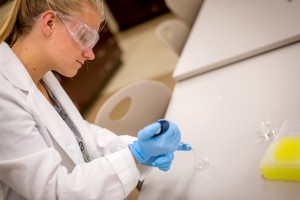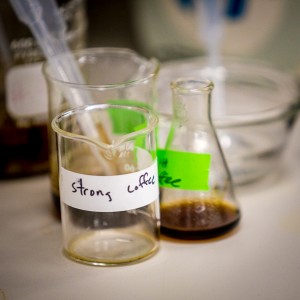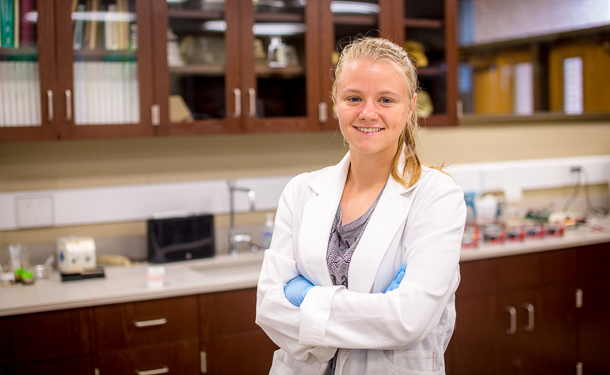Does caffeine provide a benefit to athletes? This deceptively simple question guided Hannah Daley’s research this summer.
Daley, who is planning a career in environmental chemistry, is a junior double major in chemistry and environmental sustainability at Eastern Mennonite University (EMU). She participated in a 10-week internship through the National Science Foundation Research Experience for Undergraduates (REU) program that placed her with professors at nearby James Madison University (JMU).
And while she hasn’t quite yet fully answered the question, Daley says her experience in a large lab setting gave her valuable confirmation of her present and future choices: EMU, she says, is the right place for her, providing strong skills-oriented training and confidence so that in a few years, she’ll be ready for a more competitive lab environment.
Two from EMU participate

REU is “a widely recognized research program that provides undergraduates with the chance to work in a larger university lab setting,” says Daley.
Chemistry professor Tara Kishbaugh, Daley’s academic advisor, recommended the program. “Often as many as 200 applicants are competing for about 10 spots,” Kishbaugh says. “The program is designed to help students at primarily undergraduate institutions have a research experience similar to that they would have in graduate school. And it can help students discern if graduate school is something they would enjoy as well as what sub-disciplines might interest them.”
Kishbaugh says an average of two EMU students earn an REU each year. Junior Janaya Sachs, also a chemistry major, was involved last summer with research at the University of Minnesota.
Cyclists and caffeine
Daley worked in the labs of James Madison University (JMU) professors Christine A. Hughey and Christopher Womack. Hughey is an analytical chemist who worked directly with Daley while Womack is the kinesiology department head who oversaw the entire experiment.
Analytical chemistry, as defined by the American Chemistry Society, is “the science of obtaining, processing, and communicating information about the composition and structure of matter … the art and science of determining what matter is and how much of it exists.”

Daley was quantifying how caffeine was metabolized in human serum.
In the experiment, participants ingested either caffeine or a placebo and participated in a cycling workout. Following the workout, a blood sample was taken.
“The blood would be purified into human serum,” Daley says. “I would get the serum and I would extract and quantify the amount of caffeine and its three primary metabolites present in the serum.”
Daley explains that the body breaks down what it ingests – caffeine in the case of her experiment – into metabolites that can be used by the body. “The overall goal of the research was to determine if individuals of different phenotypes metabolize caffeine at different rates when exercising and if that rate is correlated with an ergogenic benefit.”
Daley’s role in the research process was to develop a method to quantify the ratio of caffeine and its metabolites using an instrument called the “UHPLC” to measure exactly how caffeine metabolization varied between athletes and was affected by exercise.
UHPLC is an acronym for ultra high performance liquid chromatography, which was coupled with UV detection and positive electro-spray oonization and mass spectrometry.
Though Daley’s summer internship is complete, the experiment is still ongoing. Daley will be on call this fall, assisting in the lab when needed. If the findings are published, she will gain valuable academic credentials to match her experience in the lab.
First-generation student-athlete at home at EMU
Daley enjoyed working in the lab at JMU, and fed off the competitive energy from those around her, which made it easier to be excited about her work. The topic also interested her; she’s a goalkeeper on the field hockey team and athletics are an important part of her life.
Her REU research experience this summer, Daley says, was invaluable. She’s now worked with similar instruments and techniques that she’ll use in environmental chemistry, and “gained a lot of skills that will help me in my career path.”
Daley says EMU prepared her well for the competitive and fast-paced research environment and she’s now a more confident scientist and student.
“I look forward to going to a larger school for my graduate education, but I like that I am going to a smaller school as an undergraduate. I have good professors here and good friends in the program who provide support,” says Daley, a first-generation college student who came to EMU because of its commitment to sustainability and its strong academic program in that field.
